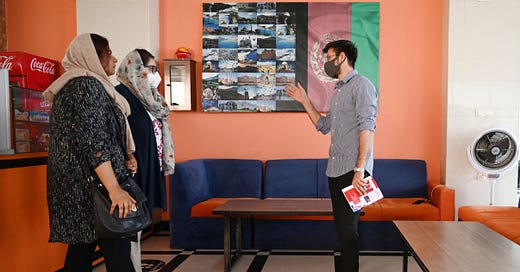Note: This is the same post I sent out last night but with the unbroken video link.
Attention deficit is not just a brain issue; at this point it’s a cultural dysfunction. How often we move from topic to topic but without the mental cohesion with which to make sense of its meaning. Collectively as well as individually, that leaves us thinking about many things but understanding very little.
The call to deepen, to get sane, to reach for the meaningful, is the calling of our times.
Deep answers do not emerge from shallow conversation, yet shallow conversation is exactly what our culture thrives on. That’s why we jump from news item to news item, talking about something for five minutes then saying “Yeah, we already covered that.”
So it is that the news media has pretty much moved on when it comes to covering what happened in Afghanistan. Yet we ourselves must not. For if we don’t come to a deeper understanding of what exactly happened there, then the end to the US presence in Afghanistan will be a little more than a pause in the action. Just as Afghanistan was a repeat in many ways of the horror in Vietnam, so too will something else emerge to be a repeat of the war in Afghanistan. The same system will take up where it left off. The only thing that can disrupt this pattern is for a critical mass of Americans to wake up to the insanity of the system itself.
We’ve discussed the corruption of the US war machine in other posts; here we’re focusing on what is going on in Afghanistan right now.
My interview is with Obaidullah Baheer, a lecturer of transitional justice at the American University in Afghanistan who decided to stay behind in Kabul although he was offered the opportunity to evacuate.
Having been educated at the University of New South Wales in Australia, Baheer is the grandson of a mujahideen fighter who then became an infamous warlord in Afghanistan. Baheer’s history is the embodiment of two worlds now clashing in his country - one very old and one very new. He himself is a shining example of both the perils and opportunities of this moment in Afghanistan.
Obaidullah has demonstrated tremendous courage; this interview is a moving reflection of the reality in his country today…
Follow Obaidullah on Twitter @ObaidullahBaheer
Peace Midst the Chaos: The Internal Journey | Obaidullah Baheer | TEDxDarulaman
Obaidullah Baheer on Democracy Now!
Audio of the episode:





Marianne, bringing 'awareness' to this deeply disturbing and heart-wrenching situation is significant. Knowing the macro picture of what's been happening can, hopefully, lead to transformational ways humanity 'will' come together as 'one' to create a thrivable, global society. We cannot hide from the constant daily turmoil but instead show-up to lend a helping hand whenever and wherever we can. And you are doing this.
Mr. Baheer's story is powerful. But, unfortunately or maybe fortunately, hearing it reveals the tragic direction of our so-called Nation States as well as global and local institutions that are failing to grasp what is truly needed for peace and resilience. We must each deeply search our hearts to see what we can do as individuals to bring the planet into harmony--reaching out in a collective manner too in order to help extricate everyone from this spiraling madness: the multiple ills facing us now. (Marianne, I saw the pain and sorrow on your face as you questioned Baheer. I am certain others watching felt feelings similar to yours--I did. Please take care of your own health, and somehow, I am projecting that all the endeavors by many, like yours, will manifest positive outcomes--sooner than not! Peace and blessings to you.)
I plead ignorance having read Rory Stewarts and Greg Mortensen's books, which left me feeling great regret that the US invades, blunders along, wages wars and accomplishes nothing. I think this is the widespread, general impression of US meddling abroad. Perhaps the actual objective is not to control but rather to disrupt such countries for criminal or covert purposes?